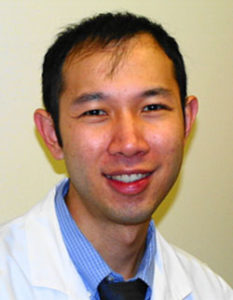We are honored to announce that A Breath of Hope’s Research Fellow, Dr. James Tsay of NYU, was recently published in Cancer Discovery – one of the highest impact papers in cancer research. Dr. Tsay’s peers around the country are calling his work, “a breakthrough in the early detection of lung cancer.”
 The published study by Dr. Tsay’s lab built on the research that was funded by the Breath of Hope Foundation in 2016 and 2017. Previously, Dr. Tsay’s team was able to detect a difference in the composition of the lung microbe in patients with and without lung cancer. In this new study, they went further to see if the specific composition of the lung microbe correlates with a patient’s prognosis and treatment response. They were able to show that having oral microbes in the lung seems to correlate with poor prognosis and worse tumor progression. In a parallel animal model, introduction of these oral bacteria into the lungs of mice also seems to show decreased survival, increased tumor burden and increased inflammation.
The published study by Dr. Tsay’s lab built on the research that was funded by the Breath of Hope Foundation in 2016 and 2017. Previously, Dr. Tsay’s team was able to detect a difference in the composition of the lung microbe in patients with and without lung cancer. In this new study, they went further to see if the specific composition of the lung microbe correlates with a patient’s prognosis and treatment response. They were able to show that having oral microbes in the lung seems to correlate with poor prognosis and worse tumor progression. In a parallel animal model, introduction of these oral bacteria into the lungs of mice also seems to show decreased survival, increased tumor burden and increased inflammation.
The team and all of us at A Breath of Hope are very excited about these findings. We hope they will be able to use this knowledge to further our understanding of microbes and lung cancer. The ultimate goal is to use this information to diagnosis lung cancer earlier and in addition, help improve the treatment response in those who are undergoing treatment for lung cancer.
Dr. Tsay said, “The research award from A Breath of Hope Lung Foundation has made a huge difference in my career and has allowed us to continue our work in this field. I am grateful.”
Thank you, ABOH donors. Together, we are impacting the field and saving lives!
Don’t Forget: We’re Here to Help!
A diagnosis of lung cancer is a life-altering event. It may leave you feeling overwhelmed, scared, stressed, or anxious. Lung cancer is associated with high levels of depression and anxiety among cancer groups. In studies, patients report a broad range of psychosocial consequences, such as frustration due to physical limitations, fear of recurrence, sadness of leaving behind a partner and children, and disappointing social support, which we call: STIGMA.
A Breath of Hope collaborates in the national lung cancer space to help change the stigma that adds addition burden and pain. But we also offer services that can reduce stress which in turn, can lead to a better quality of life and improved health outcomes. Visit our website or email us at to learn more about the following:
Rides to treatment and medical appointments (reopening in Minnesota late March; opening in SW Florida this fall)
Companionship visits with someone who understands the cancer journey (currently available for U.S. lung cancer survivors by zoom or phone)
- Patient education classes offered monthly on topics that are important to survivors
- Survivor support groups offered monthly and focused on topics chosen by survivors
- A free load of groceries, currently being offered to lung cancer survivors in the Twin Cities, MN
- Patient education online program (currently available in English and Spanish globally)
Join Our Spring Challenge
It is hard to believe that we have endured Covid-19 for a full year. Our nation now welcomes spring, a season of growth and renewal, with open arms.
A Breath of Hope is grateful (beyond words) for the support we received last year and are energized by upcoming opportunities in research, public education, and expanded services in 2021. We thank you for making our work possible!
We also acknowledge the challenges that continue – a pandemic that is especially difficult for individuals living with lung cancer, barriers to screening and early detection, and the persistent stigma associated with this disease. Above all, we grieve the dear friends we have lost.
But – we will not give up the fight! A Breath of Hope knows that catching lung cancer early is the best way to beat it. We invite you to join our 100 Day Spring Challenge kicking off on March 15th. Our goal is to raise $100K in 100 days to support early detection. Watch for our campaign kick-off by email, mail and on social media later this month!

